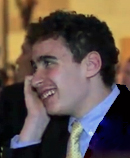|
by Mario Orsatti at tm.org/blog
March 2013
For the first 14 years of his life, Joey Lowenstein couldn’t write or read or speak. He was locked inside himself. Like millions of children who are autistic, Joey struggles to communicate and to fit into the world around him.
Stress can make life more difficult for all of us, but no more so than for those with autism spectrum disorder(ASD). Dealing with the challenges of a developmental disorder like autism or Asperger syndrome—something that affects the brain’s normal development of social and communication skills—can increase the normal stress of life tremendously.
According to the U.S. Centers for Disease Control and Prevention (CDC)
• 1 in 88 American children has autism spectrum disorder (ASD)
• Autism is four to five times more common among boys than girls. An estimated 1 out of 54 boys and 1 in 252 girls are diagnosed with autism in the United States.
• Autism Spectrum Disorder affects over 2 million individuals in the U.S. and tens of millions worldwide.
• Government autism statistics suggest that prevalence rates have increased 10 to 17 percent annually in recent years.
Can the Transcendental Meditation technique help those with ASD?
Joey Lowenstein is among a growing number of children with ASD that are learning the Transcendental Meditation technique, and who are finding that the daily practice of the TM technique significantly reduces their level of stress and improves the quality of their lives. You can see Joey and his mother practicing TM together in a video at www.tm.org/blog.
As part of his research for his bestselling book, Transcendence: Healing and Transformation Through Transcendental Meditation, Dr. Norman Rosenthal interviewed several young people with ASD who had learned TM, and their parents. As part of his book he discussed the role that TM program can play for those with ASD. Here’s an excerpt:
“Although the prevalence of ASD has been estimated as only 1 per 88, this statistic doesn’t reflect the huge toll that the condition takes on the individuals with the problem and their families. It is a lifelong disorder, with no definitive cure, which requires extensive and expensive care and help for decades.
“On a theoretical level, how might TM be helping these people with ASD? They clearly have trouble understanding the emotions and expectations of others, which makes interaction stressful and withdrawal understandable. They fear novelty, unexpected situations, and having to adapt to situations in which they don’t have control. As with so many other people, TM appears to reduce their stress and anxiety, making it easier for them to venture out, try new things, and learn new skills. In addition, it is well known that in people with ASD, there is impaired prefrontal cortex (PFC) function. As we know, the PFC is crucial for making good decisions and judgments. In many situations TM seems to boost PFC functioning, perhaps by reducing stress. This might also explain why people with ASD become more willing to explore new environments and behaviors after they start to meditate.”
In another video at www.tm.org/blog, Mrs. Yvonne Kurtz and her son Adam, two of the people that Dr. Rosenthal interviewed for his book, talk about how the TM program has helped Adam manage symptoms of Asperger’s, and has improved his overall experience at school and at home.
Facts About Autism Spectrum Disorders
from the Centers for Disease Control
Autism spectrum disorders (ASDs) are a group of developmental disabilities that can cause significant social, communication and behavioral challenges. People with ASDs handle information in their brain differently than other people.
ASDs are “spectrum disorders.” That means ASDs affect each person in different ways, and can range from very mild to severe. People with ASDs share some similar symptoms, such as problems with social interaction. But there are differences in when the symptoms start, how severe they are, and the exact nature of the symptoms.
There are three different types of ASDs:
• Autistic Disorder (also called “classic” autism)
This is what most people think of when hearing the word “autism.” People with autistic disorder usually have significant language delays, social and communication challenges, and unusual behaviors and interests. Many people with autistic disorder also have intellectual disability.
• Asperger Syndrome
People with Asperger syndrome usually have some milder symptoms of autistic disorder. They might have social challenges and unusual behaviors and interests. However, they typically do not have problems with language or intellectual disability.
• Pervasive Developmental Disorder – Not Otherwise Specified
(PDD-NOS; also called “atypical autism”)
People who meet some of the criteria for autistic disorder or Asperger syndrome, but not all, may be diagnosed with PDD-NOS. People with PDD-NOS usually have fewer and milder symptoms than those with autistic disorder. The symptoms might cause only social and communication challenges.
© Copyright 2013, Maharishi Foundation USA, a non-profit educational organization
|


